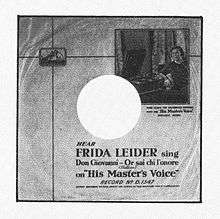Frida Leider
Frida Leider (April 18, 1888 – June 4, 1975) was a German opera singer.

Leider was one of the most important dramatic sopranos of the 20th century. Her most famous roles were Wagner's Isolde and Brünnhilde, Beethoven's Fidelio, Mozart's Donna Anna, and Verdi's Aida and Leonora. She made over 80 recordings, mainly for Polydor and HMV.
Life
Leider was born in Berlin, where she studied singing while working in a bank. Her first engagements led her to opera houses in Halle, Königsberg, and Rostock. After an engagement with the Hamburg State Opera in 1923, she was hired by the Berlin State Opera as first dramatic soprano. After her retirement from the stage in 1946, she remained there as the director and manager of a studio for the rising singers of the Berlin State Opera.
Leider made regular guest appearances for over 15 years at the Royal Opera House at Covent Garden in London, at the Metropolitan Opera in New York, at La Scala in Milan, and at the State Operas of Vienna and Munich. Naturally, she also made appearances at the Bayreuth Festival, where she was the unrivaled star soprano of the 1930s. In the 1920s, she alternated Wagnerian roles with Florence Austral at Covent Garden and the two recorded large parts of The Ring for HMV.
Leider married the first concert master of the Berlin State Opera, Prof. Rudolf Deman. The couple had no children. She died in her home city of Berlin.
Today the singer's estate is managed by the Frida-Leider-Gesellschaft, which is located in Berlin.
Autobiography
Frida Leider's autobiography, Playing My Part, was translated into English by Charles Osborne, and published in London by Calder and Boyars in 1966. It includes 32 black and white photographs, and a discography by Harold Burros.
References
- The information in this article is based on a translation of its German equivalent.
Further reading
- Liese, Kirsten, Wagnerian Heroines: a century of great Isoldes and Brünnhildes, English translation: Charles Scribner, Edition Karo, Berlin, 2013. OCLC 844683799
External links
- Frida Leider in the German National Library catalogue
- Biographical notes
- Frida-Leider-Gesellschaft